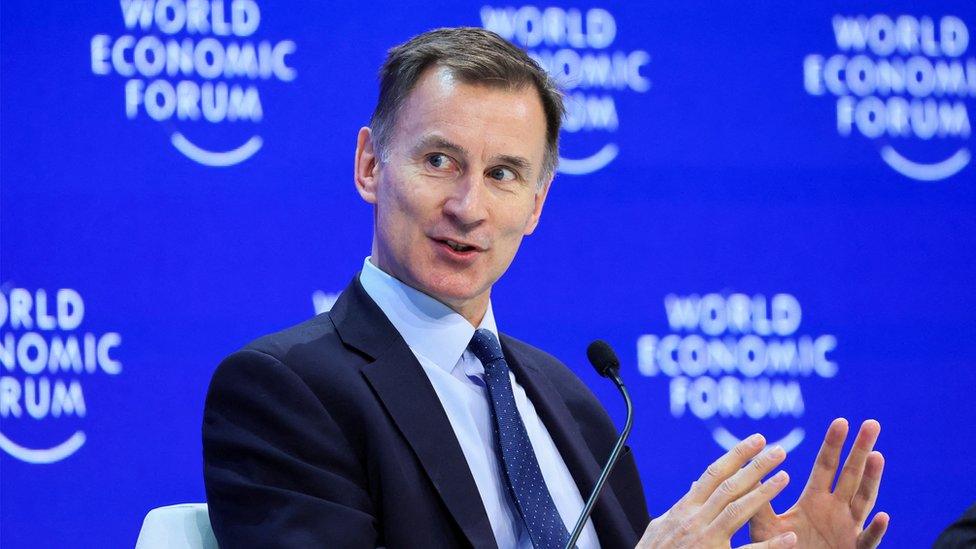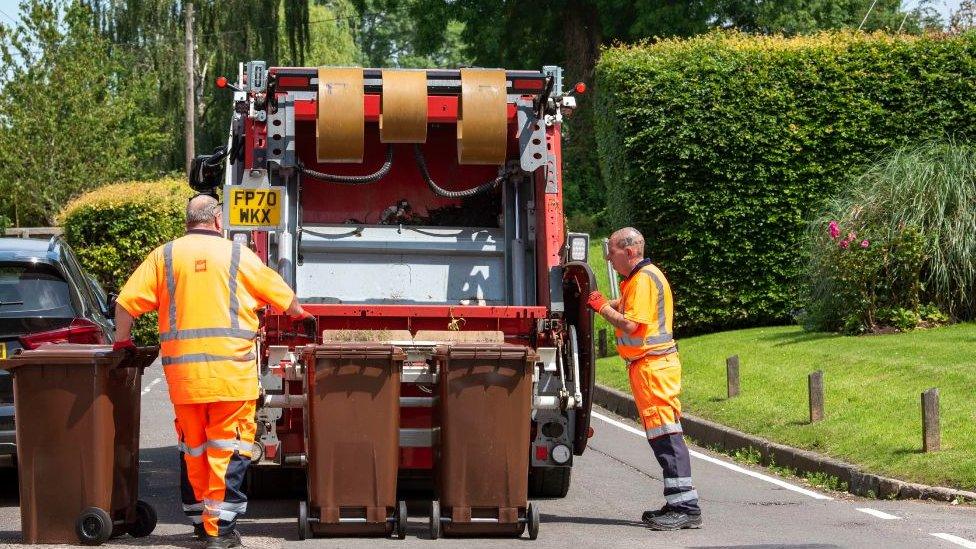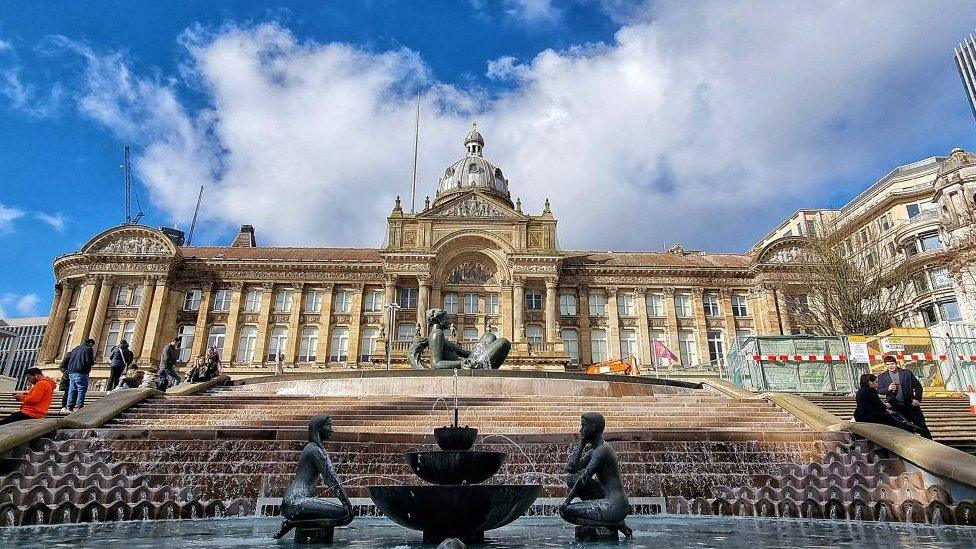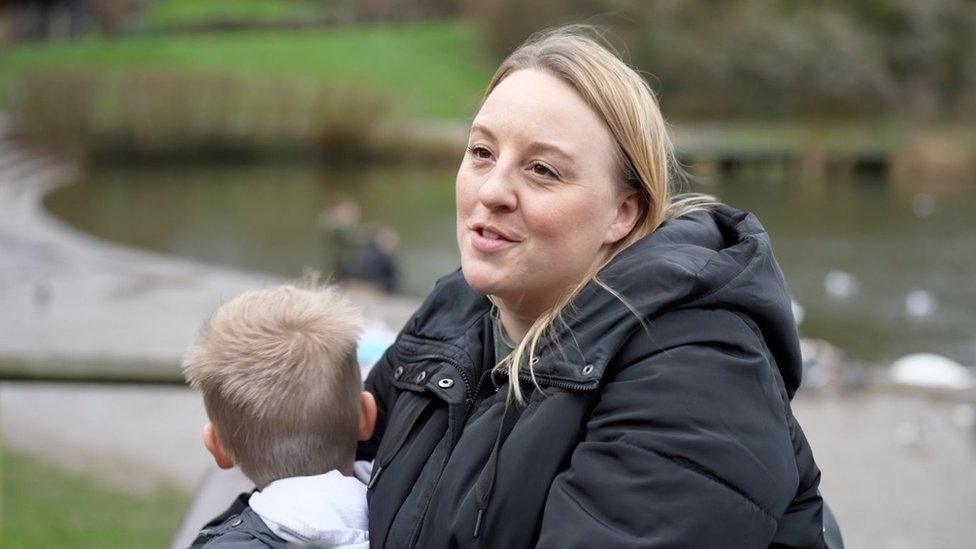Budget: Cut consultants and diversity schemes to save cash, Hunt to tell councils
- Published
- comments

Councils in England will be told to cut spending on consultants and diversity schemes when Chancellor Jeremy Hunt delivers his Budget on Wednesday.
Councils are facing severe financial pressures and eight have effectively declared bankruptcy since 2018.
This week Nottingham City Council approved big cuts to services and Birmingham is expected to do the same.
Senior government figures are also not denying that the chancellor plans to cut 2p from National Insurance.
The plan, reported in The Times, matches a similar cut Mr Hunt made in the Autumn Statement.
The Budget - taking place in the House of Commons on Wednesday - will see Mr Hunt set out his tax and spending plans.
During the statement, he is expected to freeze fuel duty for another year. The levy has not increased since 2011.
The Local Government Association said most councils spent "pence" on things like diversity schemes.
Chair of the Local Government Association, and Labour councillor, Shaun Davies told the BBC's Today programme councils' money troubles were the result of a "simple equation".
"Demand for services are going up to record highs, the cost of providing services are at record highs and cuts from central government are at record highs.
"We've seen 19 councils this year approach the government for exceptional financial assistance, we've seen more councils go bust in the last three years than in the last 30 years."
He said conversations about diversity schemes were a "distraction" from the real problems.
On consultant spending, Mr Davies argued that councils were forced to pay for consultants in order to bid for central government funding.
He urged ministers to start allocating money based on need rather than the "begging bowl culture of competitive bidding".
A recent survey found that two-thirds of councils in England are planning to cut services.
At the same time the vast majority of them are preparing to increase council tax by the maximum 5% next month.
Nottingham City Council leader David Mellen told the BBC they would be implementing "swingeing cuts" adding that social care demands, inflation and a rise in homelessness had contributed to a "huge gap" in the council's budget.
Mr Mellen said the council had "very open about mistakes in the past" including an energy project which lost the city millions.
However, he added that cuts in government funding "overwhelms anything that we have apologised for in terms of our management".
He said £100m had been taken from their budget by central government "each and every year in the last 10 years".


Councils in England receive their money from:
council tax
taxes paid by local businesses
grants from central government
rent from social housing
fees and charges (parking for example)
The money goes towards services including:
adult and children's social care
bin collections and recycling
street maintenance
transport and highways
cremation and burials
cultural services such as libraries
education
police and fire services

Councils have been warning about a precarious financial picture for a long time.
Local authorities saw budgets cut in the austerity policies of the Conservative-Lib Dem coalition government from 2010 to 2015.
Recently ministers have increased the funding available to councils but a combination of inflation and growing demand for services, particularly support for vulnerable adults and children, and housing services, has left many with budget shortfalls.
Birmingham City Council, which declared itself effectively bankrupt last year, is preparing to vote on a wave of cuts to local services and a 21% rise in its rate of council tax.
Birmingham is Europe's largest local authority, and is trying to make £300m of cuts.
Its difficulties are partly a result of a £1bn payout it had to make to settle equal pay claims brought by underpaid workers.
Earlier this year the government announced an extra £600m of funding to help plug local authority budget gaps.
At the same time Levelling Up Secretary Michael Gove said councils would have to, external draw up productivity plans by the summer explaining how they would "improve service performance and reduce wasteful expenditure".
He added that local authorities should "consider whether expenditure on discredited equality, diversity and inclusion programmes meets this objective".
Last year the government said it would be reviewing "equality, diversity and inclusion" spending in the civil service to "ensure it represents value for money".
The Local Government Association has said there is a "compelling case" for equality, diversity and inclusion practices.
Its website argues, external that "employing and engaging with people who have a range of different backgrounds, experiences and ideas increases creativity and leads to better problems solving and decision-making".
Related topics
- Published5 March 2024

- Published28 February 2024

- Published7 March 2024
